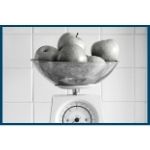Caloric Facts
Happy April Fools Day! This is a non-recipe rant lol
From basic science, I know: a calorie is the measure of heat-energy needed to raise the temperature of 1 g of water by 1 ºC. The term kCal is the term used for food (other energy terms are the Joule or kWatt).
Nearly all foods supply energy or calories that are used for growth, maintenance, or repair by the body. However, some types of nutrients provide more calories than others. In case you are curious, these are the averages:
1g of carbohydrate = 4 calories
1g of protein = 4 calories
1 g of fat = 9 calories
The overall proportion of fat, carbs and oil varies depending on your body type. Typically, you can only consume 20-30g of protein in a single meal (that translates to ½ chicken breast or ¼ cup protein powder). For myself, carbs are not well utilized and I struggle to digest complex carbs/starches (pasta, bread, potatoes) but do well with lean meats and vegetables. I also like fruit, whereas chocolate goes straight to the back of my legs. I can feel it migrate there about 20 minutes after the last bite, honest! Natural fats are needed by your body to properly digest and function. I have 1 Tbs of UDO oil in my shake each morning and cook with grape seed oil or olive oil. I also snack on ½ ounce of almonds (10-12) and sprinkle cashews or pine nuts on my salads. You should have oil in every meal.
It’s not the food itself that makes you “fat”, it’s partly about portion control. Whatever nutrients are not used by the body, one of two things happen – you pee it out or your body stores it in the form of fat. My body puts fat on the back of my thighs and my hips.
Some food isn’t used well by the body at all. One good example is alcohol; it is more of a toxin. However, it is a carb that is broken down as an energy source and can be converted to fat. Consume it wisely.
The last thing I researched is fibre – it comes from plants and is a type of carbohydrate that gives plants their structure. Fiber is not digested or absorbed by the body but it makes you feel full and can actually “soak up” cholesterol to eliminate it. About 25 grams daily is good for your bowels but you must drink lots of water to prevent bloating. I take 1 Tbs in my morning shake.
Lots more info available out there, just writing as I learn. Hope you found it helpful.
